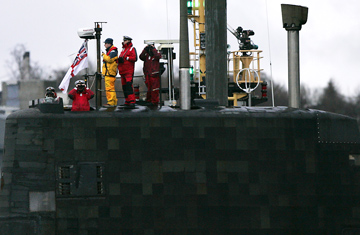
Crew from HMS Vengeance, a British Royal Navy Vanguard class Trident Ballistic Missile Submarine
Britain's Vanguard-class (V-class) nuclear submarines are pretty much your standard Doomsday boats. Each holds 16 Trident D5 missiles that, in turn, carry up to eight, independently targeted thermonuclear warheads capable of leveling an entire city. Once airborne, the missiles travel into sub-orbit, where they travel toward their target at a shade under 4 miles per second. Britain keeps at least one V-class submarine at sea at all times as the ultimate deterrent. Should mainland Britain be destroyed, Her Majesty's Navy could still surface and retaliate. The name of one of the subs says it all: HMS Vengeance.
These awesome killing machines have been designed to produce one hell of a bang. But instead, they may go out with a whimper, as budgetary wrangling threatens to force Britain to give up its continuous, at-sea nuclear deterrent.
As part of Britain's austerity cuts, the Ministry of Defense (MoD) has been asked to find savings of between 10 and 20% by 2014, and then work off of steady-level funding until 2020. Britain's V-class subs, known as Trident after the U.S.-made ballistic missiles they carry, are aging and need to be replaced by 2024. A replacement system as sophisticated as the V-class submarine will cost around $30 billion, with the first contracts to be inked by 2016.
Defense Secretary Liam Fox has said the MoD could not spend that much on nuclear subs while simultaneously cutting its budget without jeopardizing the purchasing of other big-ticket weapons such as armored vehicles, aircraft carriers, and fighter jets. He insisted the money should come not from the MoD but from the Treasury, which has traditionally paid for Britain's subs. However, Chancellor of the Exchequer George Osborne, who heads the Treasury, said that wasn't going to happen. "The [nuclear submarine] costs ... are part of the defense budget. All budgets have pressure. I don't think there's anything particularly unique about the Ministry of Defense," he said.
In response, Fox told the Metro newspaper on Friday that renewing Trident was the most "cost-effective way of maintaining Britain's nuclear deterrent ... Should Iran become a new nuclear weapon state, Saudi Arabia, Egypt and Turkey would be likely to follow suit and we could see ourselves in a new nuclear arms race."
The impasse has led some commentators to speculate that the MoD, while not giving up its nuclear weapons, may scrap its continuous nuclear-submarine patrols for a less expensive system. On Wednesday, The Royal United Services Institute, an influential London-based defense think-tank, released a report urging ministers to consider replacing Britain's V-class subs with a cheaper system and dropping the requirement of always having a nuclear submarine on patrol at sea.
Report author Malcolm Chalmers, a former nuclear adviser to two British foreign secretaries, says V-class submarines are relics of the Cold War. While Britain's conventional forces are no longer organized to defend against a military attack from the Soviet Union, its nuclear policy has "remained largely unchanged since the 1960s, when a surprise attack on Western Europe was a central driver for U.K. force planning," he wrote. The report concludes that the government should save money by either halving the number of new V-class-type boats it builds, building a new submarine fleet capable of both conventional and nuclear roles, or scrapping the submarine-based system altogether and maintaining a non-deployed arsenal to be delivered either by airplane or special forces (the latter, Chalmers concedes to TIME, is certainly too radical politically for the current government).
Any of those options would please nuclear arms-control experts, says Hans Kristensen of the Federation of American Scientists, because "it would break with one of the most deeply ingrained nuclear posture assumptions — that nuclear weapons continuously hidden in the oceans are essential for deterrence." Many arms-control commentators believe that one of the reasons Britain clings to its arsenal is that it hopes to one day use it as a bargaining chip to persuade Russia and the U.S. to make deep cuts to their massive stockpiles: you get rid of some of yours and we'll get rid of ours. But in the meantime, Kristensen says, Britain keeping its current nuclear system hurts disarmament efforts, because in order to convince nuclear countries to move towards zero, "nuclear postures must be relaxed by pulling back deployments, reducing weapons, decreasing readiness, and increasing transparency and predictability. A [submarine] bristling with nuclear warheads on highly responsive and accurate long-range missiles hiding in the oceans contradicts all of that."
Given the protection offered by the American nuclear umbrella through NATO — article five of the alliance's charter guarantees that the U.S. will treat a nuclear strike on Europe as equivalent to a strike on its own soil — Britain's nuclear arsenal has long seemed an oddity to some, with critics saying it's related not to actual security concerns but to the country's desire to retain its position as a world power well past the end of its empire.
But all elements of nuclear weaponry can seem absurd this long after the end of the Cold War. In 2007, I spent an afternoon on HMS Vengeance at its naval port in Faslane, Scotland. It was like stepping back in time — men cut off from home for three months at a time, their sole mission to rehearse, and execute if necessary, the launching of enough firepower to kill millions of civilians. The crewmen were taught that their mission would only end with the end of the world. As you read this, they are down in the depths of the Atlantic somewhere, waiting. It wouldn't be so bad, one supposes, if it was budgetary number crunching, rather than nuclear holocaust, that finally brought them in from the Cold.
